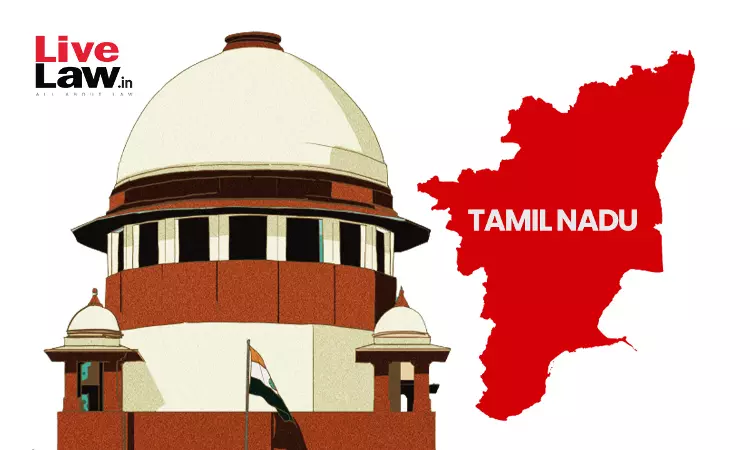- Home
- /
- Supreme court
- /
- Supreme Court Directs CEC To Probe...
Supreme Court Directs CEC To Probe Violations Of Forest & Wildlife Laws In Tamil Nadu's Agasthyamalai Landscape
Yash Mittal
5 April 2025 8:09 AM IST
Concerned over encroachments and depleting forest cover in Tamil Nadu's Agasthyamalai landscape, the Supreme Court directed the Central Empowered Committee (CEC) to survey the area and report violations of laws like the Forest Conservation Act, 1980 and Wildlife (Protection) Act, 1972. "Needless to say, that the forests form the lungs of the ecosystem, and any depletion/destruction of...
Concerned over encroachments and depleting forest cover in Tamil Nadu's Agasthyamalai landscape, the Supreme Court directed the Central Empowered Committee (CEC) to survey the area and report violations of laws like the Forest Conservation Act, 1980 and Wildlife (Protection) Act, 1972.
"Needless to say, that the forests form the lungs of the ecosystem, and any depletion/destruction of forest areas has a direct impact on the entire environment. The world at large is facing the calamities caused by the climate change, and the primary culprit behind this is the depleting forest cover owing to a myriad of issues including rapid urbanization, unchecked industrialization, encroachments, etc.", the Court observed while directing a survey of encroachment on forest land.
"India has a forest cover of about 7,15,343 sq. km as per 'India State of Forest Report 2023', which is about 21.76% (approx.) of the total landmass of the country. Nepal has 44.74% (approx.), Bhutan has 72% (approx.), and Sri Lanka has 29% (approx.) forest cover. Hence, clearly the forest cover in India is not adequate and needs to be enhanced. A recent report, submitted by the Ministry of Environment and Forests, in proceedings before the National Green Tribunal indicates that almost 13000 sq. kms. area of forests is under encroachment. This Court has time and again taken up this issue and passed mandatory directions to remove the encroachments from the forest areas and to curb any attempt to reduce the forest cover in the country.", the Court added.
The bench comprising Justice Vikram Nath and Justice Sandeep Mehta heard the case which involved a conflict between forest conservation and the rehabilitation rights of displaced tea estate workers in Tamil Nadu.
While the Madras High Court dealt with the rights of displaced tea estate workers, the intervention of the Supreme Court was sought because the High Court left forest restoration unresolved.
In 1929, Singampatti forests (3,388.78 hectares) in Tamil Nadu's Agasthyamalai landscape were leased to Bombay Burma Trading Corporation Limited ['BBTCL'] for tea/coffee plantations employing a large number of tea estate workers.
Later on, between 2007-2018, the subject land was declared a Core Critical Tiger Habitat, Wildlife Sanctuary, and Reserved Forest.
Tea estate workers evicted due to forest reclamation sought rehabilitation, jobs, and compensation.
The High Court considered their issue and directed their rehabilitation but ignored forest restoration, which was damaged due to non-forestry use.
Considering the importance of restoration of the forest areas in the entire Agasthyamalai landscape, the Court took the assistance of the Senior Advocate K. Parameshwar, Amicus Curiae, who stressed the need for a scientific survey for determining the boundaries of all the forest areas in the Agasthyamalai landscape and to identify the extent of encroachments prevailing thereupon.
“only after the forest areas are identified and distinctly demarcated, measures required to restore and rejuvenate the forest areas which are extensively being depleted owing to systematic encroachments and exploitation by cultivated plantations, going on for almost one century, can be set in motion. The forest boundaries need to be secured, preceded by a scientific survey, which should include Satellite Imagery by Remote Sensing methods and Geo-Mapping of the entire area failing which the objective of establishing the tiger reserves i.e., 'Core Critical Tiger Habitat' and having a healthy tiger population in the said reserve forests can never be achieved.”, Sr Adv. Parameshwar stated.
Mr. P.S. Raman, Advocate General for the State of Tamil Nadu, who was also present during the hearing apprised the Court that the State Government had taken proactive initiatives to ensure removal of encroachments, restoration of the forests and rehabilitation of the tea estate workers. He assured the Court that the State Government shall provide all support to the CEC in the process of survey.
“In view of the submissions noted above and as an interim measure, to initiate the process of restoration of the pristine forest areas and to protect the tiger habitats/wildlife reserves/sanctuaries falling under the Agasthyamalai landscape, we hereby direct the CEC to conduct an extensive survey of the entire Agasthyamalai landscape, which would include Periyar Tiger Reserve, Srivilliputhur Grizzled Squirrel Wildlife Sanctuary, Meghamalai and Thirunelveli Wildlife Sanctuaries. The CEC shall indicate in its report all instances of non-forestry activities going on in these areas contrary to the statutory provisions viz, the Forest Conservation Act, 1980, the Wild Life (Protection) Act, 1972, etc.”, the court observed.
“The CEC shall also recommend measures for restoration of (a) the reserved forests, (b) the tiger habitats, and (c) elephant corridors and (d) other wildlife reserves (sanctuaries) in and around the Agsthyamalai landscape, including the abovementioned sanctuaries/reserves. For this purpose, the CEC may employ all scientific procedures including Remote Sensing Satellite Imagery, Geo Mapping, etc., so that the process of survey can be expedited.”, the Court ordered.
The Court directed that the concerned officials of the State Government including the District Administration, the Police Administration and the forest officials of each district involved shall be responsible for providing all required assistance and support to the CEC for completing the process of survey.
A period of twelve weeks was granted to the CEC to conduct the entire exercise and report compliance.
The matter is posted to be heard on July 15, 2025, for receiving the report of the CEC and for further directions.
Case Title: A. JOHN KENNEDY ETC. VERSUS STATE OF TAMIL NADU AND OTHERS ETC.
Citation : 2025 LiveLaw (SC) 395



